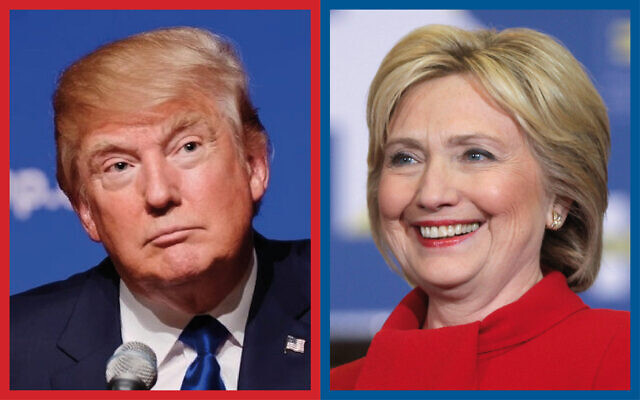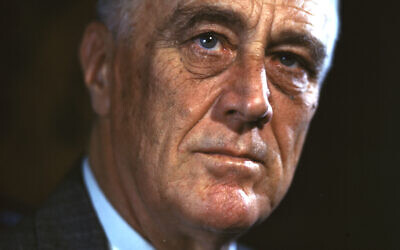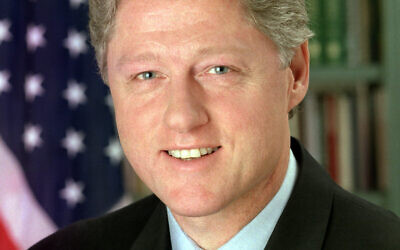Jewish Voters Bring Historic Trends and Concerns
Republican Donald Trump received 24 percent of the Jewish vote in 2016, compared with 71 percent for Democrat Hillary Clinton.
Dave Schechter is a veteran journalist whose career includes writing and producing reports from Israel and elsewhere in the Middle East.

American Jews take their civic duties seriously. Scholars estimate that Jewish turnout in president elections hovers around 80 percent or greater, far greater than the nation in general. It has been said that when it comes to the ballot box, Jews — just 2.1 percent of the population — punch over their weight.
With rare exceptions, over the past century the majority of the Jewish vote has gone to the Democratic presidential nominee. Based on exit polls after the 2016 election, Democrat Hillary Clinton received an estimated 71 percent of that vote to 25 percent for Republican Donald Trump.
Polling in advance of the 2020 election suggests that the overall trend will continue, with Democratic challenger Joe Biden netting about two-thirds of the Jewish vote and now-incumbent Republican President Donald Trump possibly improving on his 2016 share.

There are four important “battleground states” — Florida, Pennsylvania, Ohio and Michigan — where the Jewish vote could be particularly consequential, and potentially tip the balance in the presidential race, according to “The Jewish Vote 2020: More Empowered Than Powerful,” published by the Ruderman Family Foundation and authored by McGill University professor Gil Troy.
A survey of 1,000 American Jews, conducted online in February for the Jewish Electorate Institute by a professional polling firm, found that 66 percent identified as Democrats and 26 percent as Republicans. When the same pollster conducted another survey for JEI Sept. 2-7 of 810 self-identified Jewish likely voters, 67 percent said they would vote for Biden, 30 percent for Trump, and 3 percent undecided. Biden had the backing of 57 percent of male respondents and 75 percent of women.

When asked to rate 11 issues, economy/jobs was ranked as “one of the most important” or a “very important” issue by 92 percent of the likely Jewish voters, followed by health care at 91 percent, the coronavirus at 90 percent, and Medicare-Social Security at 89 percent. Though 88 percent described themselves as “generally pro-Israel,” Israel was the lowest ranked issue, at 64 percent.
The September survey was conducted before the death of Supreme Court associate justice Ruth Bader Ginsburg and Trump’s nomination of Amy Coney Barrett to fill that seat on the nine-person high court. Coming six weeks before the election, the nomination of a SCOTUS justice instantly became a priority issue.
In reviewing data from studies conducted from 2017-19, the Pew Research Center found a noteworthy tendency among Jewish voters, that “nearly half (47%) of Jewish voters who attend religious services at least a few times a month identify with or lean toward the Republican Party, compared with a much smaller share (22%) of those who attend services less often.”

Trump fares better with the Orthodox community, which makes up 10 to 12 percent of American Jewry, and for whom Israel ranks as a higher priority issue than for their co-religionists. A post-2016 election survey conducted by the American Jewish Committee determined that 54 percent of Orthodox Jews voted for Trump, compared with 24 percent of Conservative Jews, 10 percent of Reform, 8 percent of Reconstructionist, and 14 percent who identified as “just Jews.”
Israel is Trump’s primary calling card to Jewish voters, even when he suggests that his 2017 order recognizing Jerusalem as its capital of Israel was “for the evangelicals.” His supporters point to the U.S. withdrawal from the Iran nuclear weapons deal, relocation of the U.S. Embassy to Jerusalem from Tel Aviv, U.S. recognition of Israeli sovereignty over the Golan Heights, the U.S. role in Israel’s improved diplomatic relations with the United Arab Emirates and Bahrain, and Trump’s personal relationship with Israeli Prime Minister Benjamin Netanyahu.
Trump’s supporters call him the most pro-Israel president ever, while also citing his support of conservative policies that support their beliefs on such domestic issues as same-sex marriage, nomination of judges to the federal bench, government support for private education, and a law-and-order appeal that resonates with Orthodox Jews, whose communities have been victims of physical assaults.
Back in August 2019, Trump said, “I think any Jewish people that vote for a Democrat – it shows either a total lack of knowledge or great disloyalty,” the latter referring to Israel. Critics complained that Trump was dabbling in an anti-Semitic trope, that Jewish citizens of the United States have dual loyalties. The reaction was the same last month when Trump told a pre-Rosh Hashanah call with American Jews, “We really appreciate you. We love your country also, and thank you very much.”

According to academic reviews, the trend of majority Jewish support for Democrats began with unsuccessful candidates John W. Davis in 1924 (51 percent) and Al Smith in 1928 (72 percent), but became most pronounced in the four electoral victories of Democratic President Franklin Delano Roosevelt (beginning with 82 percent in 1932).
Polls show that the issues espoused by Democrats — among them health care, Medicare/Social Security, public education and race relations — rank as being of greatest importance to the majority of American Jews. Additionally, surveys by the American Jewish Committee have found that a majority of American Jews support a negotiated two-state solution between Israel and the Palestinians; believe that as part of a peace agreement Israel should give up some or all of the housing settlements built in the West Bank (also known as Judea and Samaria); and want the government to pay more than lip service to issues of religious pluralism in Israel.
From the mid-1860s until 1920, Jewish voters favored Republicans, seen in those years as the more progressive of the two major parties, though more in the post-Civil War North than in the formerly Confederate South. The 1920 election also was the last time Jewish voters favored the Republican nominee, that year Warren Harding, with 43 percent.
Roosevelt received 90 percent of the Jewish vote in winning re-election in 1940 and 1944, a figure matched only by President Lyndon Johnson in 1964.
The last Democrat to receive less than half the Jewish vote was Georgia’s own Jimmy Carter, with 45 percent in 1980 (after receiving 64 percent in his 1976 win). Republican challenger Ronald Reagan, who won the election, garnered 39 percent. No Republican has received that much of the Jewish vote since.
Bill Clinton received 80 percent of the Jewish vote in 1992 when he defeated Republican incumbent George H.W. Bush and 78 percent four years later when he won re-election against Republican Bob Dole.
Barack Obama received 78 percent of the Jewish vote in defeating Republican John McCain in 2008 and 69 percent in winning re-election in 2012 against Republican Mitt Romney.
- Hillary Clinton
- Donald Trump
- Joe Biden
- Jewish Elecorate Institute
- Jewish Voters
- Medicare
- Social Security
- Pro-Israel
- Ruth Bader Ginsburg
- Amy Coney Barrett
- SCOTUS justice
- Anti-Semitism
- John W. Davis
- Al Smith
- Franklin Delano Roosevelt
- Lyndon Johnson
- Bill Clinton
- Bob Dole
- Barack Obama
- Mitt Romney
- Dave Schechter
- Pew Research Center
- politics
- Presidential Election
- Gil Troy



comments